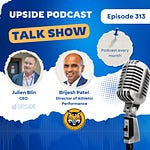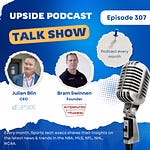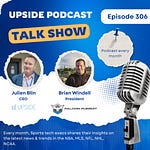This week we had the honor to interview Tim Draper. Tim is an American venture capital investor, and founder of Draper Fisher Jurvetson, Draper University, Draper Venture Network, Draper Associates and Draper Goren Holm. His most prominent investments include Baidu, Hotmail, Skype, Tesla, SpaceX, AngelList, SolarCity, Ring, Twitter, DocuSign, Coinbase, Robinhood, Ancestry.com, Twitch, Cruise Automation, and Focus Media.
Show Notes: Through this interview, we touched on his background, venture capitalism, entrepreneurship and what he is looking for when investing in startups. We also talked about the state of the crypto, NFT market and where he believes those markets are heading. He also discussed the popular social media platform Twitter. Tim also gave us his take on Elon Musk and what makes him a unique serial entrepreneur.
Best Quotes: Here are some of the key discussion points and best quotes from our conversation with Tim:
On his background:
“My grandfather was the first Silicon valley venture capitalist. And my father was a pioneer and venture capitalist. I got to see what he did and that was always helpful. And then he was the chairman of the export import bank of the United States. And then he was the administrator of UNDP. And there was a big hole left there when he left the venture business”.
“And I was able to come in and start filling the hole. I took over a small fund that had some private companies in it. And then I was able to borrow money from the SBIC program. So I borrowed $6M against a $2M value. And that $6M helped me build my record. But it looked pretty bad after the first three years. So they were going to call my loan. But after four or five years, they put my picture up on the wall as venture capitalist of the year. And that's kind of the nature of venture capitalism. Sometimes things are going very well and sometimes not so well. And today both my sons and one of my daughters are all venture capitalists too. So in my family we have four generations of venture capitalists”.
On whether or not it has become harder to invest in startups and what it was like trying to invest in startups back then in the Silicon Valley:
“No (it has not become harder to invest in startup), it just evolved. When I started in venture capitalism, I would go around in new developments, new real estate developments, and these were for software companies. They also used to have an X at the end of their names if they were tech companies. And I would knock on doors to see who was looking for money. Today that has changed significantly”.
On his deal flow and network that have become a critical part of his success over the years:
“Part of our success is due to the fact that we have become masters of deal flow. I think that if you can set up a system for deal flow, that is a constant generator of new ideas, new businesses, new entrepreneurs, then you can become a successful venture capitalist. And we have an paralleled deal flow. And it comes from Draper university, where I started to train entrepreneurs. So far we've had about 3000 students going through our program. And they've come from 101 different countries and they've started about 800 companies themselves, and they've also sent me many deals, and thousands of opportunities”.
“And then we've got “Meet the Drapers”, which is a show. In fact, I know that a lot of sports people are listening right now, but we've had both Joe Montana and Ronnie Lott on our show as guest judges, and we've had an amazing success there. We now have 12 million viewers, and we're expecting 30 million viewers for our next season. That has also generated a great deal flow for us. My profile is pretty high and being on shows like this is important. If you're an entrepreneur, you have to go on our show”.
On the top things that Tim is looking for when looking to invest in any startups:
“I don't really care if they've done it before. I do care that it's meant to be for them. That's very important. I think their dedication to the concept is key. I have to read into them: Is this gonna be 10 years of their life? Because it's certainly gonna take that long”.
“I also look for markets that are really large and where the incumbents in those markets are monopolies and they are oligopolies and they're providing bad services. So that's the market that we look for”.
“And is it an interesting technology that could permit a lot of different industries? I always like that. And do they have some access to the end user so that they can keep selling the end user things? If they can go through the business and use the business as customers to get their own customers, then that leverage is usually quite valuable. So lots of things go into a decision. It's still an Art, even though we're working on creating AI for venture capital, but it hasn't happened yet”.
On the definition of crypto and where it is heading:
“The crypto market is about taking advantage of a new technology called blockchain. And that blockchain has enabled this amazing currency called Bitcoin, but that blockchain is also enabling smart contracts. And the blockchain keeps perfect records”.
“So crypto can be a beautiful thing for a whole business. In fact, I want to have a venture fund where I can raise the fund all in Bitcoin, and where I invested all in Bitcoin, and all the entrepreneurs pay their employees and suppliers all in Bitcoin and everything is a walled garden where the accounting, the auditing, the bookkeeping is all taken care of on the blockchain automatically. That is coming”.
“And the deal between me and the entrepreneur and between me and my investors, the LPs, is all built in into a smart contract, so that that contract prevails. And there's no dispute. It’s the smart contract and it's all built into software. So I think those are major, major breakthrough technologies”.
On the state of the crypto market:
“We've gone through a couple of these cycles with Bitcoin where it kind of came up as a hype thing in 2017 where it hit $10,000. Then it came crashing down, and went to about $4,000. And it came roaring back up, and each time people come up with a new use case for Bitcoin, which created another rush of interest”.
“I believe that we're in a down trend in cryptocurrency, but that will probably wash out the cryptocurrencies that shouldn't have been there in the first place. And the big winners will show up with the next wave. So I suspect that Bitcoin's here to stay and probably the top 10 are here to stay. And then maybe some of the others. With NFTs, people got all excited about them because you could do interesting fun things with NFTs”.
On the definition and use cases for NFTs and how it could impact many industries:
“With NFTs, a celebrity could have their fan base buy an NFT, and that NFT could open special benefits to those fans. And that's the real value of it. But that's only the tip of the iceberg for NFTs, because you're going to want your healthcare records on NFTs. You're going to want your diploma, your driver's license, all that will be on an NFT. You will hold that all in a wallet. Your NFTs will also include what Art you own and other things you own like your title to various real estate properties, your stocks, and so on. They will all be held in NFTs. So think of NFTs as a way of defining, identifying and storing assets”.
“I think NFTs will be in record keeping and go into healthcare. It might also go into insurance to help keep perfect track of everything you own. There are going to be a lot of fields where NFTs are going to be important including in sports with digital sports cards or other things.
On the type of disruptive and innovative experiences NFTs that could emerge in sports which would be part of athletes or clubs’ membership loyalty programs:
“For example you could buy an NFT and be a member of the Draymond Green club. And every once in a while, through the NFT, Green will come on and he'll say: “You can do it. As a user I just learned how to win, and through this NFT it could also be Green dunking or blocking a dunk or stealing a ball or firing up his teammates. I mean, those things can sort of show up as surprises for fans who might pay a monthly to get access to it. They might pay $5 per month just to once in a while, hear something from Green where he would do something cool”.
“You could create a model for every one of those top athletes and each athlete could have their own NFT fan club and that fan club could operate just the way the yacht club operates. It's like “Hey, if you're a part of, it's a big deal. And so I could set it up so that they are going to pay $5 for the Green fan club every month, but then I want my next one (player fan club) to only cost me $4 per month and then the next one may be $3 per month. And so that I can be the fan of 20 of my favorite players”.
On why he is betting on bitcoin among all the cryptocurrencies out there:
“Cryptocurrencies have all sort of traded the same. When one goes up, they all go up and one goes down, they all go down. That's because people are really buying baskets of them. But there are some cryptocurrencies that have just been orphaned and then there are some cryptocurrencies like Bitcoin that have a huge following and a lot of people behind them and they will be the first. Currency anybody uses Bitcoin to buy things at retail and they will be the biggest. And so I look and I say, “well I think that's a better bet. And that's where I'm making my bet is on, on Bitcoin and a few of the other ones that are good specialty coins that have a real purpose and a good solid group of engineers behind it”.
On what’s happening at Twitter right now:
“It's interesting, Jack Dorsey is a free speech guy, and he believes in free speech and somehow he moved away from that. Maybe he didn't believe it in the first place but he must have felt a lot of pressure from his team or the people around him to start muting free speech”.
“Putting muzzles on people or even blocking people completely is not right. Elon saw that. And we were losing a lot of that free speech, which is actually why he's moved his team from California to Texas, because California is where that muting is taking place in a big way”.
“And it's a bad thing. We really need everybody to say what's on their mind and say any words they wanna say. That debate becomes very powerful. And that's why America was so great for so many years. It was that we had free speech. It was the first amendment. It was free speech”.
“And meanwhile, Facebook and Twitter have been putting clamps on people. And those clamps make people not feel free. And if you don't feel free, you're not gonna innovate. You're not gonna be an entrepreneur. You're not gonna try new things because you're too afraid to say anything. The algorithm on Facebook will block you basically. It is set up to block people that they don't agree with, which is ridiculous”.
On what makes Elon Musk a special entrepreneur:
“He is out there thinking for himself (…) He also has a voice in his head saying “ we have to save the earth or we have to get off of it. And so he's doing everything he can to make the world better. And Tesla's done a great job to get us off fossil fuels”.
“And then if we can't save it, we wanna to be able to hedge humanity. And so he is getting us to Mars. So I think the guy is extraordinary. I think he's clearly one of the best people we've ever had on the planet. And he's incredibly bright and fearless. And he goes after what he thinks is right. And he's been right a lot. And he also puts everything behind what he does. It's complete force. There's no hedging. There's no room for liners or sitters or people are pulling the sleigh backwards. He's just saying “ this is the way the sleigh is going and we're gonna make something great happen here”.
You may also like:
🔮 2022 Upside Top Sports Tech Predictions (NFT/Metaverse, Sports Performance, IPOs/M&As..)
🔗 🔥 Upside Analysis: NFTs Vs Crypto Vs Digital Currency, How Are They Different?
🔥 Upside Chat: Dave Hancock, CEO, Apollo (Leading Athlete Management Systems (AMS) vendor)
🔥Upside Chat: Alexi Pianosi, Strengths and Conditioning Coach, Pittsburgh Penguins (NHL)
🔥Upside Chat: Pierre Barrieu, High Performance Director, Toronto FC (MLS)











